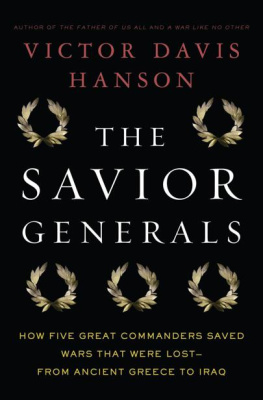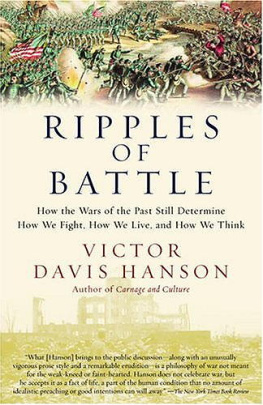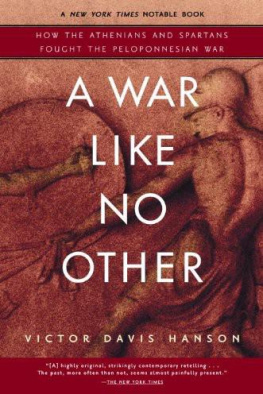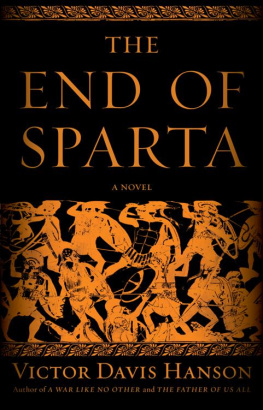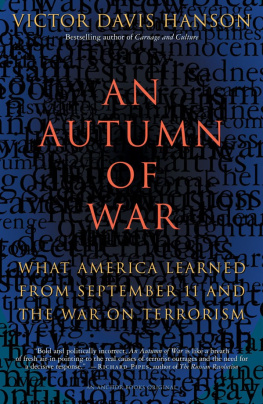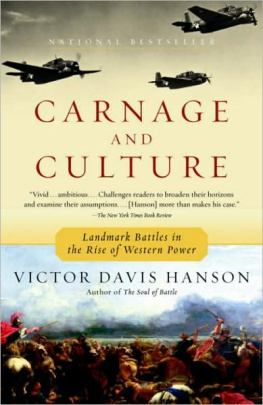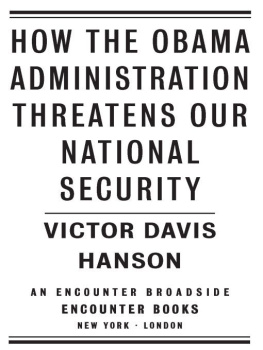Victor Davis Hanson - Ripples of Battle: How Wars of the Past Still Determine How We Fight, How We Live & How We Think
Here you can read online Victor Davis Hanson - Ripples of Battle: How Wars of the Past Still Determine How We Fight, How We Live & How We Think full text of the book (entire story) in english for free. Download pdf and epub, get meaning, cover and reviews about this ebook. year: 2004, publisher: Knopf, genre: History. Description of the work, (preface) as well as reviews are available. Best literature library LitArk.com created for fans of good reading and offers a wide selection of genres:
Romance novel
Science fiction
Adventure
Detective
Science
History
Home and family
Prose
Art
Politics
Computer
Non-fiction
Religion
Business
Children
Humor
Choose a favorite category and find really read worthwhile books. Enjoy immersion in the world of imagination, feel the emotions of the characters or learn something new for yourself, make an fascinating discovery.

- Book:Ripples of Battle: How Wars of the Past Still Determine How We Fight, How We Live & How We Think
- Author:
- Publisher:Knopf
- Genre:
- Year:2004
- Rating:5 / 5
- Favourites:Add to favourites
- Your mark:
- 100
- 1
- 2
- 3
- 4
- 5
Ripples of Battle: How Wars of the Past Still Determine How We Fight, How We Live & How We Think: summary, description and annotation
We offer to read an annotation, description, summary or preface (depends on what the author of the book "Ripples of Battle: How Wars of the Past Still Determine How We Fight, How We Live & How We Think" wrote himself). If you haven't found the necessary information about the book — write in the comments, we will try to find it.
Victor Davis Hanson: author's other books
Who wrote Ripples of Battle: How Wars of the Past Still Determine How We Fight, How We Live & How We Think? Find out the surname, the name of the author of the book and a list of all author's works by series.
Ripples of Battle: How Wars of the Past Still Determine How We Fight, How We Live & How We Think — read online for free the complete book (whole text) full work
Below is the text of the book, divided by pages. System saving the place of the last page read, allows you to conveniently read the book "Ripples of Battle: How Wars of the Past Still Determine How We Fight, How We Live & How We Think" online for free, without having to search again every time where you left off. Put a bookmark, and you can go to the page where you finished reading at any time.
Font size:
Interval:
Bookmark:
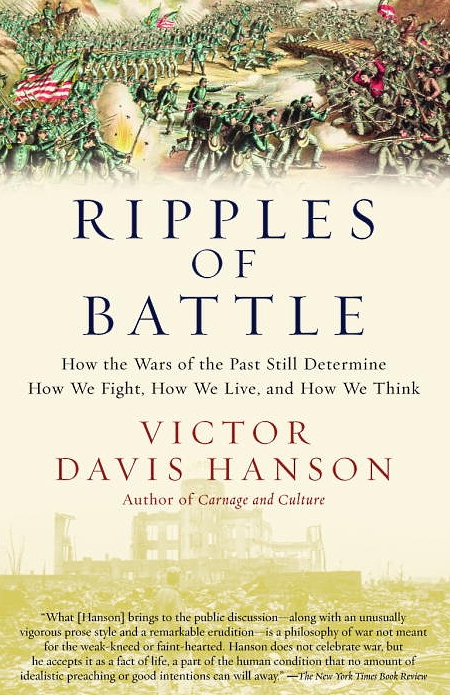
RIPPLES
OF BATTLE
How Wars of the Past
Still Determine How We Fight,
How We Live, and How We Think
Victor Davis Hanson
DOUBLEDAY
New York London Toronto Sydney Auckland
Contents
CHAPTER 1
The Wages of Suicide: Okinawa, April 1July 2, 1945
CHAPTER 2
Shilohs Ghosts, April 67, 1862
CHAPTER 3
The Culture of Delium, November 424 B.C.
To the memory of Victor Hanson
F Company, 2nd Battalion, 29th Regiment, 6th Marine Division
Killed in Action, May 18, 1945Okinawa
List of Maps
Introduction
On my rare visits to the local cemetery, I am always struck by the unremarkable grave of Victor Hanson. The inscription is as spare as the stone itselfname, state, rank, dates of birth and death, and nothing much more except the nondescript 29 Marines / 6 Marine Div / World War II. Unlike the other impressive tombstones of relatives in the family plot, there are no inscribed res gestae, not even a loving father much less a beloved grandfather. A man who dies tragically, young, and alone does so without capital, either monetary or human. When he leaves behind no progeny, it is evident in the modesty of his commemoration.
But then his mother died in childbirth, his father was blinded in the vineyard by a sulfur-machine accident. He was killed at twenty-three, without wife or children, his body eventually shipped back and reinterred in Kingsburg, California. And because Victor was an only child, when he died on Okinawa, his father Victor Hansons thin line perished as well. Had his memory vanished as well?
Certainly there are no Hansons left of Victors direct ancestry to appreciate the significance of his modest epitaph, whose calculusdeath recorded on May 19, 1945, serving in the 29th Regiment, 2nd Battalion, Company F of the 6th Marine Divisionreflected his presence at the nexus of one of the worst days of the bloodiest campaign in the Pacific theater, the final assault and capture of Sugar Loaf Hill and its environs. William Manchester, of the same regiment, wrote of the bloody assaults on Sugar Loaf:
Infantry couldnt advance. Every weapon was tried: tanks, Long Toms, rockets, napalm, smoke, naval gunfire, aircraft. None of them worked. If anything, the enemys hold on the heights grew stronger. The Japanese artillery never seemed to let up, and every night Ushijima sent fresh troops up his side of the hill. We kept rushing them, moving like somnambulists, the weight of Sugar Loaf pressing down on us, harder and harder. And as we crawled forward, shamming death whenever a flare burst over us, we could almost feel the waves of darkness moving up behind us. In such situations a man has very little control over his destiny.
Victor was shot as his company beat back the last death-charges of suicidal Japanese to defend the hill, dying on Okinawa on the evening (May 18) before those who were left of his 29th Marines were finally relieved and evacuated from the battle. The official history of American operations on Okinawa reads, A platoon of Company F also tried to advance along the ridge toward the west, but the leader was killed and the platoon withdrew under heavy mortar fire. The authors then summarize the sacrifice, On the next day, 19 May, the 4th Marines relieved the exhausted 29th Marines. During the 10-day period up to and including the capture of Sugar Loaf the 6th Marine Division had lost 2,662 killed or wounded; there were also 1,289 cases of combat fatigue. In the 22nd and 29th Marines three battalion commanders and eleven company commanders had been killed or wounded.
In addition, the official history of the 6th Marine Division remarked of the exposed position of Company F on Sugar Loaf on the day of Victors death that heavy fire continued to come from Horseshoe Hill and company F was dispatched in that direction. The assault was perfectly maneuvered; the Marines went right to the crest, where the fight developed into a grenade battle at close quarters with a terrific mortar barrage.
To read accounts of those savage uphill assaults against entrenched Japanese is to wonder not why Victor was killed on May 18, but how in Gods name had he lived that long? After all, in just a few days, three thousand Marines were killed or gravely wounded in and around Sugar Loaf Hill, more Allied soldier casualties than lost on Monte Cassino and about the same number as on Tarawa. His 29th Regiment suffered 82 percent casualties on Okinawa and for all practical purposes had ceased to exist.
Yet without ostentatious stones, lasting works of fame, or any surviving immediate family, had the childless, young Victor Hanson really perished on that godforsaken hill with dozens of his friends on May 18? Surely not. Growing up, I heard his name nearly daily. My father was his first cousin, but the two were more like brothers, given their near-identical ages and lifelong companionship; for a time they lived side-by-side on adjoining farms, went to the same college, and joined the Marines. And so it was that the last half century our parents talked often about this mysterious dead man. If only Vic had lived, the refrain went, followed by all sorts of counterfactuals concerning the subsequent sad fate of his father, his high school and college prospects, whom he might have married, children reared, partnerships entered with my father, grandparents consoled, college work that presaged future success, farms savedrather than people saddened, sickened, and cast adrift, and homesteads soon to be sold or lost. I began as a child almost to resent this shadowy moral exemplar, who had died without making a mistake, thus leaving his namesake with the burden of emulating such character.
My mother and father both offered these what-ifs, since all three of them had left farms in central California to attend the College of the Pacific together up in Stockton. He was a wonderful man, I would hear from her as a youth. After my mothers death, Victors high school girlfriend, now widowed in her eighties, with great-grandchildren, often emerged from the past to keep up the refrain of praise and honor; she has now supervised the construction of a small memorial to the four fighting Hansons in the center of Kingsburg Memorial Park, once the site of their ancestral homestead. She visits still, and just a few weeks ago left me a formal handwritten note that ended:
Cpl. Hanson, only son and child of Victor Sr. and grandson of Nels and Cecilia Hanson, was killed in action on May 19, 1945age 23 years and 3 months, along with another 12,500 valiant young men. The Kingsburg Recorder said of Victor Jr.He reflected the gentility emanating from his grandmother Cecilia (reared by her when he became a motherless infant). Those who knew him, all apprised him as a gentle man. Victor Hanson, Jr. never returned to his home on 1965 18th Avenue, Kingsburg, CaliforniaHanson Corner. He was awarded the Purple Heart posthumously.
From his surviving yellow letters on Marine stationery, I had already sensed just that humility, unusual even for the accepted modesty of that better age. And then recently I received a phone call from eighty-year-old Michael Senko, who occupied the foxhole where Victor died, and without warning had replied to my efforts in learning about Victors last moments. He too emphasized his gentleness, adding that he was a perfect guythis remembrance from over a half century later. In a letter to his grandparents from basic training at Camp Lejeune, North Carolina, after briefly and nonchalantly detailing all sorts of trial amphibious landings, marathon marches, and assorted tests of endurance, Victor was far more concerned with the health and safety of his octogenarian surrogate parents back home here in the 1940s small farming town of Kingsburg. The final paragraph reads: Im really glad to hear that you are all fine, because I wonder all the time if you are all O.K. Im just fine, couldnt be better and never weighed more. I guess I weigh over 200not enough hard work I guess. Well I guess I better close for now. Hoping this letter finds you all well and fine, Love Victor.
Next pageFont size:
Interval:
Bookmark:
Similar books «Ripples of Battle: How Wars of the Past Still Determine How We Fight, How We Live & How We Think»
Look at similar books to Ripples of Battle: How Wars of the Past Still Determine How We Fight, How We Live & How We Think. We have selected literature similar in name and meaning in the hope of providing readers with more options to find new, interesting, not yet read works.
Discussion, reviews of the book Ripples of Battle: How Wars of the Past Still Determine How We Fight, How We Live & How We Think and just readers' own opinions. Leave your comments, write what you think about the work, its meaning or the main characters. Specify what exactly you liked and what you didn't like, and why you think so.

